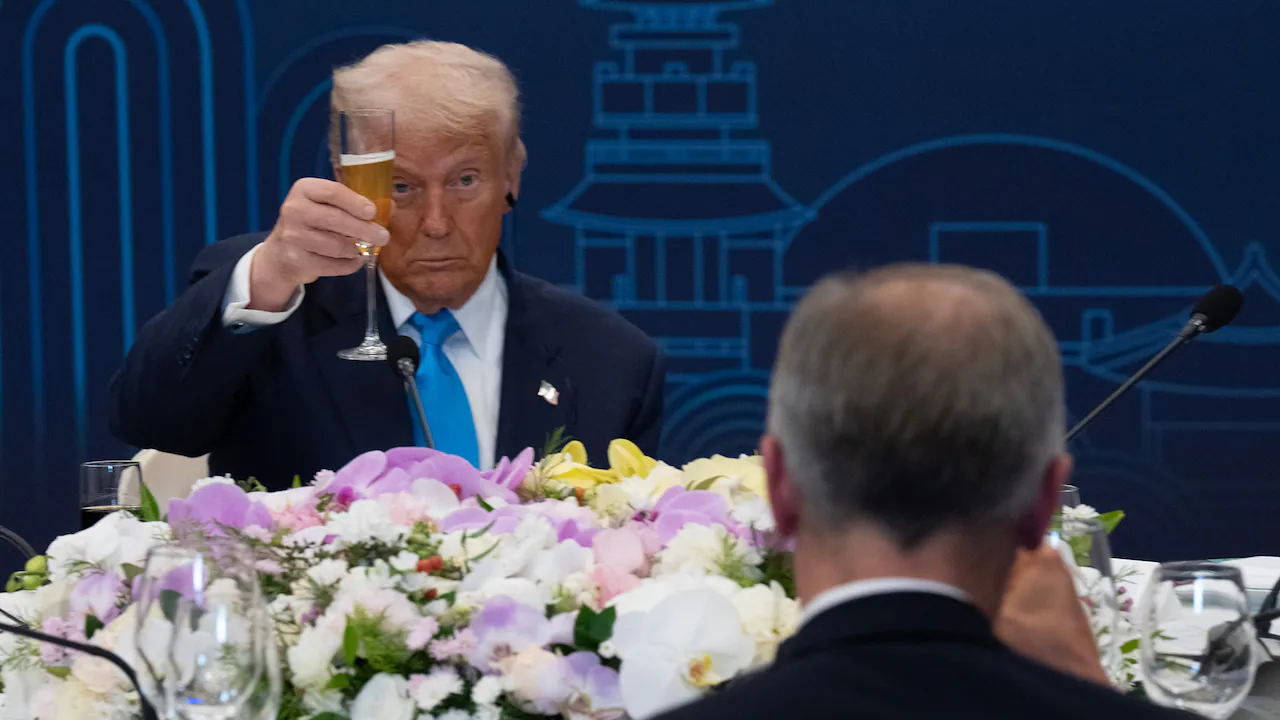Copyright cbc

U.S. President Donald Trump and Prime Minister Mark Carney were seated across the table and even acknowledged each other during a toast at a dinner ahead of the Asia-Pacific Economic Co-Operation Summit on Wednesday. But the two leaders appeared to have virtually nothing to say to one another in a visible demonstration of the frost that's formed over the U.S.-Canada relationship. It was the first time the two leaders met face-to-face following Trump’s cancellation of trade talks over an Ontario government anti-tariff television ad. Afterwards, the prime minister — in response to a shouted question from a Global News journalist — said he had "very good conversations with all the presidents" at the dinner. As Carney arrived in South Korea, his troubles with the U.S. were right in his face, as Air Force One was parked on the tarmac in front of his plane. Canada appears stuck between a rock and a hard place heading into the APEC meeting, where Carney will — among other things — attempt to reset the country’s relationship with China. On one hand, there is the visibly deteriorating relationship with Trump, who is refusing to talk to Carney and has cancelled trade talks. Trump posted on social media on Wednesday that he didn’t come all of the way to South Korea to talk with Canada. At the same time, Carney is in the delicate position of trying to diversify trade — something you can’t do without talking to Beijing, which represents the world’s second-largest economy. China is also the biggest economic rival to the U.S. Any concessions Canada might be prepared to make to reboot the relationship with China — for example, by revisiting electric vehicle tariffs — are going to face extra scrutiny or even outright hostility in Washington. The China conundrum Trump appears to be entering APEC ready to make trade concessions — or at least adjust tariffs — to secure a broader deal with China. How much latitude Carney has to do the same is an open question. Ahead of Trump’s meeting with Chinese President Xi Jinping, there are published reports in the U.S. that Washington could reduce tariffs on Chinese products in exchange for China committing to stricter controls on fentanyl precursor chemicals. One expert cautioned not to read too much into the pre-summit publicity because, as Canada has shown, the U.S. trade table could easily and unexpectedly be flipped over. “Trump personally likes Xi quite a bit, so I'm sure there's going to be all sorts of hype after this meeting that, look, the U.S.-China relationship is on a positive course again,” said Jonathan Berkshire-Miller, a principal at Pendulum Geopolitics Advisory. “I would really be cautious to buy into that, because it could easily happen five days later — or two weeks later — that all of a sudden the U.S.-China relationship's on a worse trajectory.” In meeting with Xi on Friday, Carney will have to be careful not to irritate Trump or lose sight of the fact that China often doesn’t play by the same geopolitical rules we do, Berkshire-Miller added. “Not saying we do our policy because of the U.S., but … if there's any big takeaway in that meeting that focuses on removing the EV tariffs as a tit-for-tat, I think that's going to look remarkably weak on our side,” Berkshire-Miller said. Ottawa slapped the EV tariffs on Chinese vehicles at the behest of the Americans — duties that were met with counter-tariffs by China on Canadian canola. “China does not view its foreign policy tools the way that we may view our foreign policy tools, and the second that [China] feels that it needs to leverage any of those economic tools, it absolutely will, and it will be adversarial to our interests.” Summit a 'great opportunity' for Carney Answering questions earlier in the week about the planned meeting with China, Carney downplayed expectations of a major breakthrough. The U.S. won’t be the only one watching how Carney handles the meeting with Xi. Other Indo-Pacific allies, many of whom the prime minister met and courted earlier in the week at the Association of Southeast Asian Nations (ASEAN) summit, will be paying attention as well. There’s a lot of skepticism in Asian capitals, Berkshire-Miller said, about how truly committed Canada is to diversifying trade away from the U.S. They also worry about how rapprochement with China will affect not only trade but their growing desire for security assurances. “The region wants more than just trade,” said Berkshire-Miller. As if to underscore that point, South Korea’s acting ambassador Canada said in a recent interview with Radio-Canada that Carney’s visit to his country, which will include a stop at the Hanwha Ocean shipyard — one of two bidders on Canada’s submarine replacement program — is an important signal of commitment. “It's also a great opportunity for Prime Minister Carney to reassure and re-emphasize Canada's commitment to the Asia Pacific and the partnership with Korea,” said Young-gi Ahn, the Korean chargé d'affaires in Ottawa. “In the face of the heightened global challenge, geopolitical and geoeconomical uncertainty, Korea and Canada need each other. We can be a reliable partner.” While Carney has used his Rolodex of high-level business contacts in the region over the last few days — securing meetings with the prime minister of Singapore, the CEO of oil giant Petronas and the chairman of Temasek Holdings, one of the world’s biggest private equity firms — the U.S. and China have scrambled to lock down new deals or enhance their trading relationships in the region. Trump signed a flurry of deals with other countries to secure access to the supply of rare earth minerals, a critical sector that China has long dominated and which is essential to advanced manufacturing. Agreements of various magnitudes were signed with Japan, Malaysia, Thailand, Vietnam and Cambodia. It’s a focused, clear bid to reduce dependence on China before Trump meets Xi. Two days after Trump left the ASEAN meeting, China took its turn and announced an upgraded free trade agreement with the group of 11 countries. The agreement will broaden co-operation in transportation, digital trade, the green economy, sustainability and disaster prevention, among other things.



